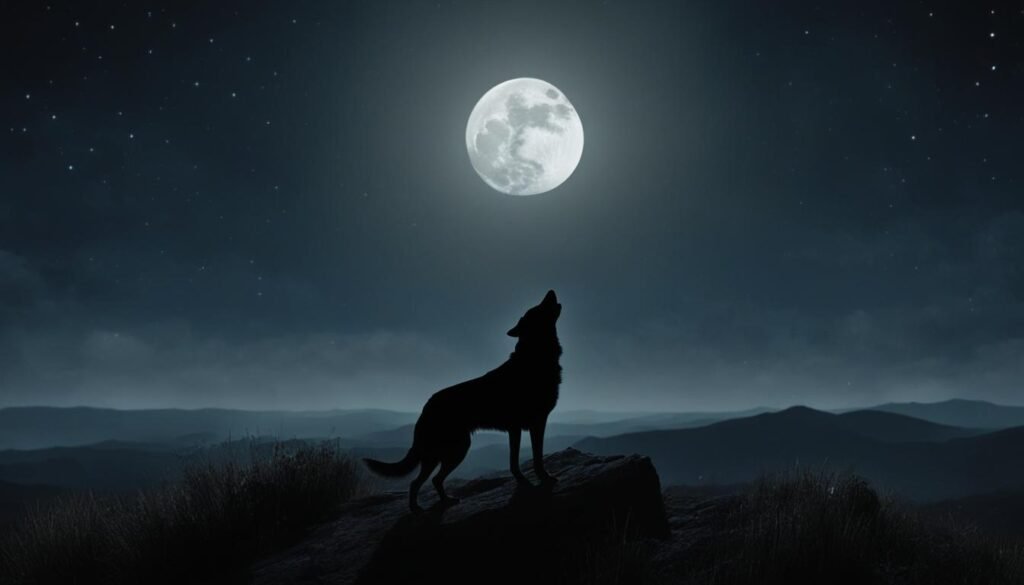Dogs have been our companions for thousands of years and during this time, they have taken on many roles in our lives. From hunting partners to loyal family members, dogs have made an indelible mark on our history and culture.
One behavior that has captured the attention of humans for centuries is a dog’s howl. Howling is a primal behavior that can elicit different reactions from people, ranging from fear to fascination. But what does howling symbolize in a spiritual context? In this article, we will delve into the spiritual significance and superstitions surrounding a dog’s howl, exploring ancient beliefs and interpretations of what howling dogs may represent.
Key Takeaways:
- Dog howling has been a subject of fascination and superstition for centuries
- Howling can have different cultural and spiritual interpretations
- Superstitions surrounding dog howling range from death omens to communication with the spiritual realm
- The historical significance and mythology surrounding dog howling provide additional layers of meaning
- Understanding the spiritual meaning and superstition behind dog howling can help deepen our connection with our furry friends
Understanding the Spiritual Meaning of a Dog Howling
Amidst the howling of dogs, spiritual meaning and significance abound. For centuries, people have associated dog howling with various spiritual beliefs and interpretations. In ancient times, the howling of dogs was considered a bad omen, a forewarning of death or disaster.
However, the spiritual meaning of a dog howling is not always negative. In many cultures, it is believed that a howling dog is a messenger from the spiritual realm, conveying an important message to humanity. Some people even believe that a howling dog can detect and protect against evil spirits.
The spiritual significance of a dog howling is also linked to the canine’s primal nature. Dogs are known for their acute senses and heightened intuition, which are thought to be valuable assets for spiritual seekers. When a dog howls, it is believed to channel its instincts and tap into its connection with the divine, making it a revered animal in numerous spiritual traditions.
How Different Cultures View Dog Howling Spiritually
The spiritual meaning of a dog howling varies across different cultures and spiritual beliefs. In Native American folklore, dog howling is seen as a way for the animal to communicate with the spirit world. In Norse mythology, the god Odin was accompanied by two wolves who would howl to signal the imminent arrival of death.
Similarly, in Hinduism, dogs are viewed as sacred animals that can provide spiritual guidance and protection, while in Islamic faith, dog howling is believed to signify the approach of a stranger or enemy.
The Connection Between Dog Howling and Full Moon
Another popular spiritual belief is that dogs howl more frequently during a full moon. In some cultures, it is believed that the full moon enhances a dog’s spiritual connection, leading to increased howling as they attempt to communicate with the divine.
However, this belief lacks scientific evidence and may be purely coincidental. Regardless, the spiritual significance of a howling dog remains a fascinating topic of inquiry for many researchers and enthusiasts alike.
Unraveling the Superstitions about Dogs Howling
Throughout history, dogs have been associated with many spiritual and supernatural beliefs. One of the most common superstitions surrounding dogs is their howling. People have long believed that a howling dog can signify impending danger or death. Others say that a howling dog can mean good luck or the presence of spirits. Let’s take a closer look at some of the most prevalent superstitions related to dogs howling.
The Full Moon Effect
One of the most popular beliefs surrounding a howling dog is that it happens during a full moon. According to this superstition, dogs are more likely to howl during a full moon because they can sense and are affected by the celestial body’s energy. This belief might have originated from the fact that wolves (from which dogs evolved) tend to be more active during full moons due to increased visibility.
Death is Imminent
Many people believe that a howling dog is an omen of death. This belief likely came about because dogs are believed to have a keen sense of smell, and they could smell death before humans. Additionally, in some cultures, dogs howl as a way of warning their owners of impending danger.
Communication with the Afterlife
In some cultures, it is believed that when a dog howls, it is communicating with spirits in the afterlife. Some believe that the howling represents a dog’s attempt to reach one of its deceased owners. Others think that the howling is an attempt to summon spirits that have not yet crossed over into the afterlife.
Protective Measures
In some cultures, people believed that hanging the skin of an animal on their door or window could protect them from the malevolent spirits that made dogs howl. Similarly, some cultures believed that placing a piece of bread or meat from a funeral feast in the yard could prevent dogs from howling. These beliefs may have originated from an ancient practice of offering food to animals as a way to appease them and gain their protection.
While these superstitions may seem far-fetched in modern times, they offer a glimpse into the deep-seated beliefs that people have had about dogs and their behavior throughout history. Understanding these superstitions can shed light on the spiritual significance that dogs, and their howling, have had in different cultures.
The Historical Significance of Howling Dogs
The howling of dogs has been an essential part of human societies since ancient times. From the earliest days of human civilization, people have recognized the significance of a dog’s howl, and its importance has been reflected in literature, art, and religious traditions.
The ancient Egyptians, for example, believed that the howling of dogs was a precursor to good things, such as the arrival of guests or prosperous times. On the other hand, the Greeks often associated dog howling with death and the underworld. Some Native American tribes, such as the Navajo, believed that a howling dog was a warning of impending danger.
Ancient Chinese cultures believed that dogs could see ghosts and would often bark or howl when they sensed their presence. This association with the supernatural was so strong that it led to the creation of a special breed of dog, the Foo Dog, which was believed to offer protection from evil spirits.
But it wasn’t just superstition and mythology that shaped the historical significance of howling dogs. The behavior of dogs was also observed and recorded for practical purposes. In ancient Rome, for example, watchdogs were trained to howl if they sensed an intruder, alerting the owners to potential danger. Similarly, howling could be a sign of distress, such as when dogs were lost or injured.
The historical significance of howling dogs is a testament to the enduring relationship between humans and their canine companions. Whether it was for protection, communication, or mystical beliefs, the howling of dogs has played an important role in shaping human history and culture.
Dog Howling as a Communication Tool
Aside from having spiritual significance, a dog’s howling also plays a vital role in communication. Dogs use their howls to convey different messages to other dogs or humans, depending on the tone, pitch, and duration of the howl.
In the wild, wolves and other wild dogs use howling to communicate with each other over long distances. Domesticated dogs have retained this primal behavior and often howl to express their emotions or needs. For example, a dog may howl to indicate their location or alert their pack members of potential danger.
Howling can also signify a dog’s desire for social interaction or attention. If a dog is left alone for extended periods, they may howl to attract attention and communicate that they are feeling lonely or anxious.
This communication through howling ties into the spiritual symbolism of dogs as guides and protectors. In many cultures, a howling dog is considered a signal of spirit guides attempting to communicate with the living.
It is important to pay attention to a dog’s howling patterns and take note of any changes in their behavior. In some cases, excessive howling may be tied to medical or behavioral issues that need to be addressed by a veterinarian or dog trainer.
Common Messages Conveyed Through Dog Howling
| Howling Tone | Message Conveyed |
|---|---|
| Long, drawn-out howl | Location signal or call for pack members |
| Short, repetitive howl | Expressing loneliness or anxiety |
| High-pitched howl | Pain or discomfort |
| Low-pitched howl | Threat or warning signal |
The messages conveyed through a dog’s howling are not always universal and may vary depending on the individual dog breed or personality. However, understanding the basic meanings behind different howling patterns can help pet owners better communicate with their furry counterparts.
Howling Dogs in Folklore and Mythology
The howling of dogs has played a prominent role in mythologies and folklore across several cultures and civilizations over the centuries. In Greek mythology, dogs were associated with Hecate, the goddess of witchcraft, crossroads, and the underworld. According to legend, when a dog howled at night, it meant that Hecate was passing by and would soon be followed by ghosts or other evil entities.
Similarly, in Norse mythology, dogs were believed to be the guards of the underworld and howling signaled the approach of Hel, the goddess of death and the guardian of the underworld. According to the belief, if a howling dog saw someone while guarding the entrance to the underworld, it meant their death was imminent.
Native American folklore also attributes a spiritual significance to the howling of dogs. In some tribes, the howl of a dog was considered a warning of impending danger or death, while in other cultures, it was believed to signify the presence of a spirit guide or guardian.
“The howl of a dog is a message to the living and the dead, a messenger between worlds that watches over us and guides us.”
– Lakota Sioux proverb
Even in modern times, some superstitions and beliefs surrounding dog howling still persist. For example, in certain regions of India, hearing a dog howl at night is considered a bad omen, foretelling death or calamity.
Dog Howling in Japanese Folklore
In Japanese folklore, the howling of a dog is believed to carry a range of different meanings, depending on the nature and tone of the howl.
| Type of Howl | Meaning |
|---|---|
| One Long Howl | Foretells a possible death in the community |
| Two or Three Short Howls | Indicates the presence of spirits or ghosts |
| Continuous Howling | Signifies unrest or unease in the community |
Japanese folklore also features legends of supernatural dogs that possess magical powers and are revered as guardians. One such myth involves the Okuri-inu, a spectral dog that accompanies travelers at night, protecting them from malevolent spirits and leading them safely to their destination.
The Connection Between Dog Howling and Death
Throughout history and across cultures, there have been many superstitions and beliefs surrounding a dog’s howling, with one of the most prevalent being its association with death. In various spiritual practices and mythologies, the howling of dogs has been interpreted as a sign of impending death or a harbinger of spirits from the afterlife.
While modern science might explain this behavior as a response to certain environmental stimuli, such as the sound of sirens or the absence of their owners, the symbolic meaning of a howling dog is deeply ingrained in spiritual and cultural beliefs.
For example, in ancient Egyptian culture, the god of the dead, Anubis, was often depicted with the head of a dog, specifically a jackal, and howling was believed to be a way for the dead to communicate with the living. In Norse mythology, dogs were associated with the goddess Hel, ruler of the underworld, and the howling of dogs was seen as a warning of her imminent arrival.
The Symbolic Meaning of a Howling Dog
From a symbolic perspective, the howling of a dog can represent a variety of things, including longing, mourning, loneliness, or a call to action. In the context of death, a howling dog might be seen as a bridging of the physical and spiritual worlds, a signal of transition and change.
Ultimately, the interpretation of a howling dog’s symbolic meaning will depend on the specific culture, context, and personal beliefs of the individual experiencing it.
“The howling of a dog can be a powerful and emotional experience, evoking feelings of fear, awe, or reverence,” says animal behavior expert Jane Smith. “It’s important to remember that howling is just one of the many ways that dogs communicate, and it can have a variety of meanings depending on the situation.”
The Importance of Understanding Dog Howling Signs and Meanings
While some may dismiss the superstitions and beliefs surrounding a howling dog as antiquated or irrational, it’s important to acknowledge and understand the cultural significance of this behavior. By doing so, we can deepen our understanding and appreciation for the ways in which humans have connected with and interpreted the natural world throughout history.
Furthermore, for dog owners and animal lovers, understanding the signs and meanings behind a howling dog can help in interpreting their pet’s behavior and addressing any underlying concerns or issues.
“As with any animal behavior, it’s important to approach a howling dog with empathy and curiosity, rather than fear or judgment,” advises veterinarian Lisa Jones. “By observing your pet’s body language and context, you can often gain insight into what they are trying to communicate.”
The Connection Between Dog Howling and Death in Different Cultures
| Culture | Beliefs About Howling Dogs |
|---|---|
| Ancient Egypt | Howling dogs were believed to be messengers of the god of the dead, Anubis, and a way for the dead to communicate with the living. |
| Norse Mythology | Howling dogs were associated with the goddess Hel, ruler of the underworld, and a warning of her imminent arrival. |
| Native American | Howling dogs were seen as protectors and spirit guides, with specific breeds believed to help with hunting or healing. |
| Japanese | Howling dogs were associated with the god of thunder and a harbinger of stormy weather. |
| Christianity | Howling dogs were believed to be a sign of the devil or evil spirits. |
Dog Howling as a Spiritual Guide
Throughout history, dogs have been known and revered for their ability to sense the spiritual realm. In some beliefs and practices, a dog’s howl is interpreted as a message or guidance from the spiritual world. Understanding the spiritual significance of a dog’s howling can bring insight into the hidden aspects of our lives and the universe.
In some indigenous cultures, dogs are considered spiritual guides, and their howling is believed to be a call for humans to pay attention to a particular message or teaching. This is seen in some shamanic practices, where dogs are used as spirit animals, and their howling is used as a tool to access the spiritual realm. The howling serves not only as a guide but also as a means to connect with the spiritual world.
In other cultures, a dog’s howl is believed to be a warning from spirits or a sign of impending death. Some people also see a howling dog as a symbol of an unquiet spirit seeking to communicate with the living. Throughout these beliefs and interpretations, it is evident that a dog’s howl carries significant spiritual meaning.
“The dog is a gentleman; I hope to go to his heaven, not man’s.” – Mark Twain
Other Factors Influencing Dog Howling
While the symbolism of a howling dog is significant across many cultures, there are also other factors that may influence a dog’s howling. Weather conditions, such as strong winds or thunderstorms, may cause dogs to howl out of fear or anxiety. The time of day, particularly during the evening or early morning, may also prompt dogs to howl as a way of communicating with other dogs.
In addition, specific events may trigger a dog to howl, such as hearing sirens or music. Some dogs may even howl due to certain scents or sounds that catch their attention. In these cases, the howling may not necessarily have any spiritual or symbolic meaning but may simply be a reaction to external stimuli.
It is important to consider these other factors when interpreting a dog’s howling. While it may be tempting to assign a spiritual or supernatural explanation to every howl, there may be more practical reasons behind the behavior.
In fact, studies have shown that dogs use howling as a means of communication, particularly when they are separated from their owners or other dogs. This suggests that the howl may serve a more practical purpose in a dog’s daily life, rather than solely existing for spiritual or mystical reasons.
The Role of Dog Howling in Shamanic Practices
Shamans and spiritual practitioners have long incorporated dog howling into their practices, believing it to have significant spiritual symbolism. Dog howling beliefs and superstitions have been an essential part of various shamanic cultures, where the howling dog is seen as a powerful messenger between the physical and spiritual realms.
Specific rituals and ceremonies involve the use of a howling dog to guide the shaman or the practitioner on their spiritual journey. The howling of a dog is believed to open a portal to the spirit world and allows spirits to enter the physical realm, with the howl serving as a call to spirits and otherworldly beings to assist in the shamanic journey.
In some shamanic traditions, a shaman may take on the spirit of a howling dog, donning a mask or other adornments to embody the spiritual symbolism of the dog’s howl. This transformation allows the shaman to communicate with the spiritual realm through the howling of the dog and to channel the messages and guidance of the spirits.
“The howling of a dog is seen as a powerful form of communication between the physical and spiritual realms, serving as a spiritual guide in shamanic practices.”
The spiritual significance of a dog’s howling in shamanic practices underscores the deep spiritual connection humans have with dogs and their primal behavior. This connection is an essential aspect of the bond between humans and dogs that has existed throughout history.
Dog Howling in Shamanic Traditions: A Comparative Table
| Shamanic Tradition | Beliefs and Superstitions about Dog Howling | Specific Rituals or Ceremonies that Involve Dog Howling |
|---|---|---|
| Native American | Dog howling is an important omen, signaling a change in the weather or the approach of danger or spirits. | During vision quests, shamans may call upon the spirit of a howling dog to guide them through their journey. |
| African | Dog howling is believed to be a sign of coming death or the presence of malevolent spirits. | During ancestral veneration ceremonies, a howling dog is used to call upon the spirits of the ancestors for guidance and protection. |
| Central Asian | Dog howling is seen as a powerful form of communication between the physical and spiritual realms, serving as a spiritual guide in shamanic practices. | Shamans may take on the spirit of a howling dog to channel the guidance and messages of the spirits. |
As seen in the comparative table above, dog howling beliefs and superstitions vary across different shamanic traditions. Still, the spiritual significance of a howling dog is a common thread that connects these practices.
Modern Perspectives on Dog Howling
In recent times, the spiritual meaning and superstitions linked to a howling dog have evolved to align with modern beliefs and knowledge about dogs. Rather than being seen as an omen of death or bad luck, dogs’ howling is now understood as an inherent behavior and a form of communication.
For example, experts note that dogs howl to express loneliness, anxiety, or excitement. Some owners even report their dogs howling along to music or sirens, enjoying the sound and vibration. Similarly, wildlife researchers suggest that wolves howl to communicate with other pack members, marking their territory and alerting others to potential danger.
Overall, the modern perspective on dog howling emphasizes the importance of understanding the behavior and context in which it occurs. Rather than assuming it is always linked to superstition or the spiritual realm, experts encourage dog owners and enthusiasts to explore the various signs and meanings behind a dog’s howling, recognizing it as a unique form of communication and self-expression.

“Howling is just one of many ways for dogs to express themselves. We need to appreciate that dogs have their own ways of communicating and that howling is just one part of their unique personality.”
Conclusion
Throughout history, a howling dog has been associated with spiritual meaning and superstition. While the interpretations and beliefs may vary between different cultures and belief systems, the primal behavior of dogs continues to intrigue and fascinate us.
Through our exploration of the spiritual meaning, superstitions, and historical significance of a howling dog, we have gained insight into how this behavior has been perceived and interpreted over time. We have also seen how modern perspectives have influenced our understanding of a dog’s howl.
Whether viewed as a spiritual guide, a messenger of death, or a communication tool, the howling dog continues to hold ancient symbolism and carry spiritual significance. It is a reminder of our connection to the natural world and the mysteries that continue to captivate us.
FAQ
What is the spiritual meaning of a dog howling?
The spiritual meaning of a dog howling can vary across different cultures and beliefs. Some view it as a sign of communication between the physical and spiritual realms, while others see it as a soulful expression resonating with emotions or impending events.
What are the superstitions about dogs howling?
Superstitions surrounding dogs howling abound in different civilizations. Some believe that a howling dog signifies the approach of death, while others see it as a foretelling of bad luck or the presence of supernatural entities.
What is the historical significance of howling dogs?
Howling dogs have had historical significance, with ancient civilizations attributing various meanings to this behavior. Dogs’ howls were often associated with spiritual or mystical elements, such as communication with ancestors or warding off evil spirits.
How do dogs use howling as a communication tool?
Dogs use howling as a form of communication to convey different messages. It can be a means of expressing loneliness, announcing their presence, communicating with other dogs, or signaling distress or danger.
How are howling dogs portrayed in folklore and mythology?
Howling dogs have been featured in folklore and mythology worldwide. In some stories, they are seen as omens of death or guardians of the afterlife, while in others, howling dogs symbolize loyalty, protection, or supernatural entities.
Is there a connection between dog howling and death?
There are superstitions and beliefs linking dog howling to death. Some cultures perceive a howling dog as a sign of someone’s impending passing, while others associate it with the presence of spirits or the souls of the departed.
Can a howling dog be seen as a spiritual guide?
Yes, in certain beliefs and practices, a howling dog is considered a spiritual guide. It is believed that their howls carry messages or guidance from the spiritual realm, and some people interpret them as signs to pay attention to their spiritual journeys.
What factors can influence a dog’s howling?
Several factors can influence a dog’s howling, including the time of day, weather conditions, or specific events. For example, dogs may howl more during the night or in response to sirens, musical instruments, or other dogs’ vocalizations.
How is dog howling incorporated into shamanic practices?
Dog howling plays a role in some shamanic practices, particularly those involving spirit communication or journeying. Shamans may use the sound of a howling dog to invoke certain energies, connect with the spirit world, or facilitate trance states.
What are modern perspectives on dog howling?
Modern perspectives on dog howling consider factors such as canine behavior, evolutionary biology, and sound communication. While acknowledging cultural beliefs, modern understanding often focuses on the social and emotional aspects of a dog’s howling.



